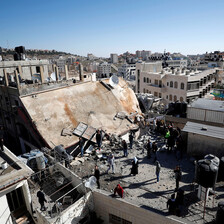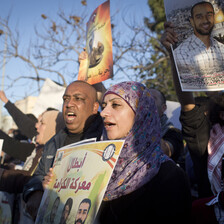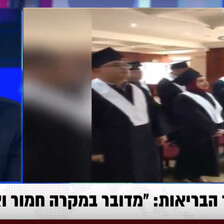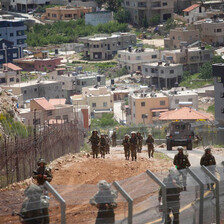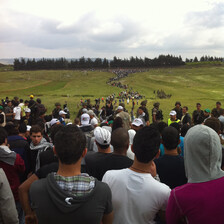The Electronic Intifada 31 May 2011
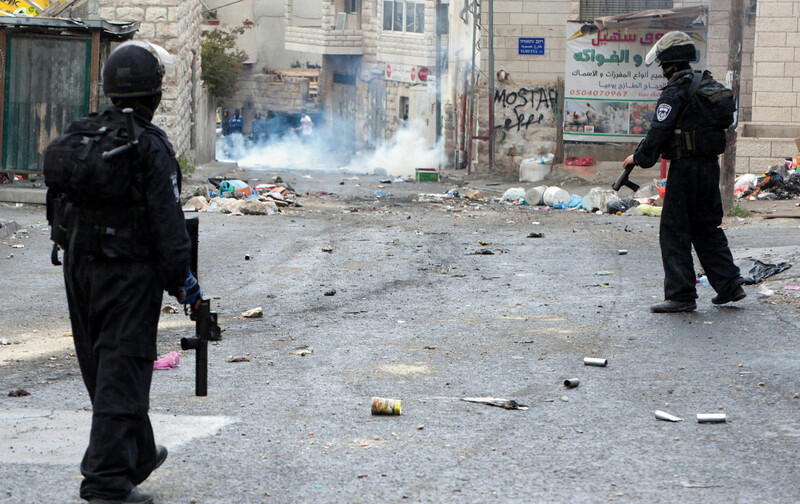
Israeli forces confront Palestinian youth in the East Jerusalem neighborhood of Issawiya on Nakba day, 15 May 2011.
ActiveStillsMuch attention has been paid to the marches of Palestinian refugees in Lebanon and Syria to the borders with occupied Palestine, as well as the courageous protests at the Qalandiya checkpoint in the occupied West Bank and in Gaza. But Palestinians inside what is known as the green line, Israel’s internationally-recognized armistice line with the occupied West Bank and Gaza, marched on 15 May as well. We converged on the borders with Lebanon in a symbolic protest of the apartheid regime that has confiscated our lands, discriminated against us and attempted to strip us of our national identity.
The day started with apprehension. The bus which was supposed to arrive from the Palestinian Bedouin village of al-Araqib to Jerusalem was stopped by Israeli security forces on its way and three of the passengers were detained by Israeli police. An hour later, we were forced to go with another driver from Jerusalem toward the Lebanese border town of Maroun al-Ras.
On our long journey to the north, we were frantically following updates from Qalandiya, Gaza, Maroun al-Ras and the village of Majdal Shams, in the Israeli-occupied Golan Heights. For the 25 passengers on the bus, it was a mix of anxiety, pride toward the incredible courage displayed by the young Palestinian revolutionaries, and hope. Very few of us actually believed that we would be able to make it to the borders and that we would be able to welcome our returning Palestinian sisters and brothers back home. But we wanted to send a clear message to the Israeli occupation that we are here to stay and that the Palestinian struggle for freedom, dignity and justice is resolute.
As we arrived in the checkpoint near the destroyed village of Birim, protesters who came from Haifa and Nazareth were either arrested or forced to leave after being violently dispersed by the Israeli border police. We were not allowed by the “security” forces to reach the borders as they declared it a closed military area. So we decided to hold our protest and chant at the checkpoint.
Armed with the power of our just cause and our loud voices, we chanted for 25 minutes in solidarity with our comrades in Maroun al-Ras, Majdal Shams, Gaza and the West Bank, and vocalized that even after 63 years, we haven’t forgotten the catastrophe of 1948 and we have not given up on the rights of Palestinian refugees to return.
The Israeli police had enough of us and ordered us to leave. We did not oblige and carried on our chants. Meissa Irshaid, an attorney with the Public Committee against Torture in Israel, tried to explain to the deputy commander of the Galilee district, Kobi Bachar, that our standing near the checkpoint did not violate any law. But just as she was speaking with him, Bachar smacked her viciously in her face and then the police started kicking us, firing tear gas at us and arresting more protesters.
Maath Musleh, a Palestinian blogger at Palestine Youth Voice and freelance social media consultant, was one of eights activists who were detained in the prison in the northern city of Safed for a night and later put under house arrest for four days. “I just witnessed the first ten seconds of the attack, for then four soldiers attacked me and dragged me to the street,” Musleh said.
“A soldier stepped with his knee on my face. My eyes were looking at an old man laying still on the ground and hearing and smelling the gas bombs that have been fired at the peaceful demonstrators. As I was staring at the soldiers’ eyes, I saw fear. Fear of the strength of the [righteous]; fear of the strength of the Palestinian people whom they failed for 63 years to break,” he added.
Describing the night he spent at the Safed prison, Musleh said: “When I was locked in my cell in Safed prison, I endured the worst three aspects of being locked down in prison. Firstly, it was really hurtful to see some Palestinians working side by side with your enemy to oppress you; the judge who imposed the four-day house arrest on us was an Arab as were some of the prison guards.”
“Secondly, I was wondering if the movement beyond the walls of the prison was ongoing. I was engulfed with the fear that the people had laid down,” Musleh added. “Thirdly, I was overwhelmed by a feeling that someone out there has sacrificed more than I did. We lost dozens of martyrs that day. People lost their lives for their rights. I have lost nothing.”
Lawyer Meissa Irshaid, who was also detained for a night and put under house arrest for four days, summed up the heart-wrenching irony of the Nakba perfectly: “My family was among the families who were expelled from Safed in 1948. It is ironic that, 63 years later, I was forced to return to my hometown Safed in shackles.”
Budour Youssef Hassan, originally from Nazareth, is a Palestinian socialist activist and third-year law student at the Hebrew University in Jerusalem. Follow her on Twitter: twitter.com/Budouroddick.
